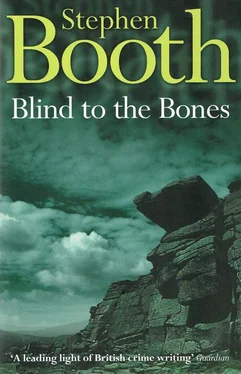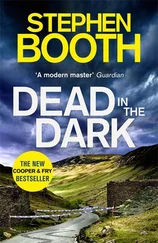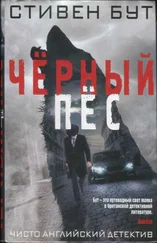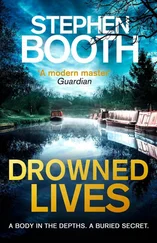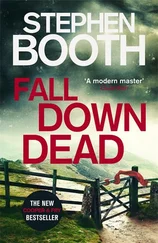Cooper shook his head. ‘The trouble is, I really don’t think there’s anything I can do.’
‘She has false hopes, don’t you realize that?’ said Angie, with a brief flash of anger that Cooper found familiar. ‘Diane has expectations that I can never live up to. Quite the opposite. When she found out the truth about my life, she would be so ashamed of her sis that it would knock the bottom out of her world. She always had a kind of fragile sense of security. She always needed something to hang onto to make her feel safe in the world.’ She paused, and gave him that challenging smile, even through the tears. ‘Aren’t you going to tell me that people change in fifteen years?’
Cooper wanted to tell her exactly that, but sensed that Angie was right. It fitted in with his own impressions of Diane. He had always thought there was an underlying fear that she barely kept suppressed by hanging on to the stable things in her life — her job, and her promotion ambitions. And her memories of her sister.
‘Are you on or off it right now?’ said Cooper.
Angie Fry smiled that slow, sad smile, but with the instant deviousness in her eyes, the expression that told him she was wondering what lie to use.
‘Maybe I’d better not tell you that,’ she said. ‘You being a policeman, and all. I wouldn’t want to compromise your principles.’
And Cooper knew she was right. If Angie was using heroin now, he would be in difficulties. If she had to get her fix while she was here, he didn’t want to know. He didn’t want to be forced into that position.
But he couldn’t help studying her eyes, an automatic reflex from his training. Of course, Angie saw him doing it, and met his stare with undisguised challenge.
‘Red eyes, it’s dope,’ she said. ‘Dilated means amphetamines. But “pinny” eyes — then, it’s heroin.’
Cooper kept on looking. But something must be wrong with his powers of observation. When he looked into Angie’s eyes, he couldn’t see any of the symptoms of drug abuse. All he could see were the pain and the loneliness. And beyond them, that brief flicker that turned his heart for a moment as he looked deep into the eyes of Angie’s younger sister.
He watched her pick up her rucksack from the floor. ‘Where are you staying tonight?’
She straightened up, pushed the hair from her forehead, gave him that smile. ‘I don’t know. Can you recommend a good shop doorway somewhere? I’ve got the sleeping bag.’
‘You’re living rough?’
‘I’m on the streets. What did you think? That I was staying in some smart little hotel with room service and an en-suite bathroom?’
‘Haven’t you got any money?’
‘I haven’t had a chance to get any today.’
‘How do you usually get money?’
‘How do you think?’
He hoped she meant by begging, but he decided not to press it. ‘You shouldn’t be sleeping on the streets, Angie.’
‘Tell me about it.’
‘It isn’t safe.’
‘So? If you’re so concerned about it, what are you going to do? Are you going to ask me to stay the night here?’
‘No.’
‘No, I thought not. It wouldn’t do, would it? What would people say? What would our Di say?’
She went out into the hallway and opened the front door. Cooper held it for her while she pulled her rucksack over her thin shoulders, and watched her step out on to the pavement. She looked around, weighing up which way to go, trying to remember where the shops were, or whether there was a park she might find, and a shelter with a vacant bench.
‘There are plenty of benches by the river walk, but it’ll be colder down there,’ said Cooper. ‘Water loses heat faster at night.’
‘Thanks for the tip,’ she said.
‘The market square is quiet, but only after about three o’clock in the morning, when the night-club crowds have gone home. And it’s market day tomorrow, so the market staff will arrive at 5 a.m. to start setting up the stalls. That can be a bit noisy.’
‘Thanks a lot.’
‘And if you slept on my sofa, you’d have to put up with the cats. They’re a complete pain. Diane hates cats, so I expect you do, too.’
She looked down the street again. Cooper could hear the sound of the cars on Meadow Road. There was a car stereo playing rap music far too loud, and somebody burning rubber off their tyres as they accelerated from the lights. A traffic patrol would be hanging around later to discourage the boy racers. There was a burst of raucous laughter and the rattle of a can on the pavement.
‘I’m not like Diane at all,’ said Angie. ‘I’m quite the opposite, in fact. I thought you would have realized that by now.’
Cooper looked at her slim hand brushing away the hair, the narrow shoulders, the wiry body, the challenging look in her eyes as she turned towards him. ‘You’re not entirely the opposite,’ he said.
‘Maybe not. But I’ll tell you something — I don’t mind cats. I quite like them, within reason.’
‘Reason has nothing to do with it.’
‘I know.’
‘And you’ll have to be out of here by 8 a.m.’
‘Do you have to be at work?’
‘Out by 8 a.m.,’ said Cooper.
‘OK, it’s a deal, then. Cats and all.’
He took her rucksack off her as she walked past him back into the house.
‘Thanks, by the way,’ she said.
‘Right.’
‘It’s OK, there’s no need to say “you’re welcome”. Because I know I’m not. You just had a sudden vision of me being attacked by some pervert on a bench by the river during the night. And then it might have come out that the friendly local bobby, Constable Cooper, had told me that was the best place to sleep. Not good for your reputation, eh?’
‘I’ll get you some blankets,’ said Cooper.
‘Yeah. Thanks.’
For a moment, Cooper remembered the feeling he’d experienced just before he answered the door to Angie. That premonition of disaster.
But he pushed the feeling aside. She’d be out of his flat by 8 a.m. tomorrow — he’d make sure of it. And that would be the last he would ever see of Angie Fry. He’d make certain of that, too.
Tuesday
For the past three nights, Diane Fry had dreamed that she found Emma Renshaw’s body. Emma had been dead for two years, and the skin had shrunk to pale tatters on her skull, so that it had become a rubber mask that could be twisted and rearranged into any shape you wanted. For Fry, it transformed into the face of a sixteen-year-old girl — a face as familiar to her as her own, and yet alien. A face that left her sweating, and thrashing her limbs in tangled bedclothes.
Fry knew this fear. This kind of fear was insidious. You could go to bed at night feeling free of it. Yet when you woke in the morning, you found it had descended from the darkest corners of your room and clung to you like cobwebs.
So the smell, the sound or the movement that she knew ought to be innocent, suggesting safety, now brought with it not a specific fear, nor a memory of the event that had scarred her in the first place. Instead, it created a sort of general dread, a vague, shapeless terror of something she couldn’t picture or name. In everything now she saw something to fear. The blood in the poppies, the mould in the grass. The bones under the skin of the girl.
That morning, something finally occurred to Fry that she should have known for a long time. She might well be living in a fantasy world of her own making, just as much as the Renshaws were. Angie Fry was no more likely to come home now than Emma Renshaw was. After all, Angie had been gone for fifteen years. A decade and a half. Fry had to repeat it to herself, but it still didn’t mean what it should. Hardly any time at all had passed in her own mind — not in that corner where Angie was still a teenager full of life, setting off for a rave somewhere, leaving the house with a laugh and a brief kiss for her younger sister, vanishing into the night in a whiff of scent and the smell of dope.
Читать дальше
Конец ознакомительного отрывка
Купить книгу
